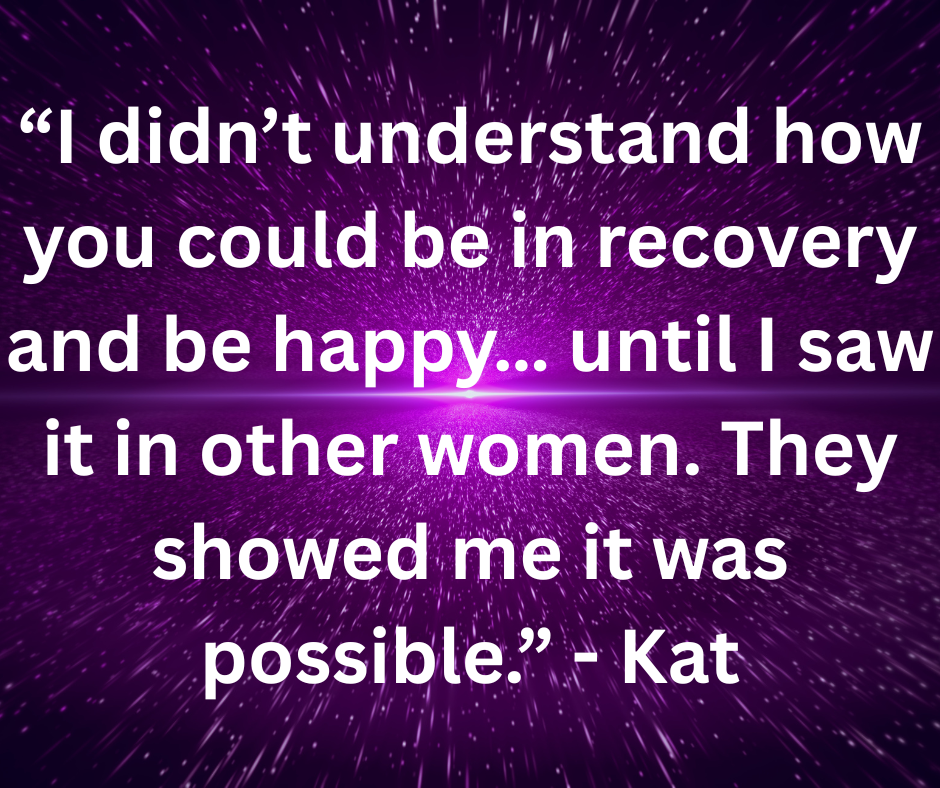
In our latest episode, Podathon For Recovery: Kat’s Road to Recovery, we had the privilege of speaking with Kat Leonard Scott, a truly inspiring woman whose journey through trauma, addiction, and recovery is a testament to the power of resilience and the importance of community. Kat's story is one of profound challenges, but also of immense hope, and her willingness to share her experiences offers valuable insights for anyone struggling with addiction or supporting someone who is. This blog post expands upon our conversation, delving deeper into the key moments of Kat's life and highlighting the lessons she's learned along the way. From her early struggles to finding purpose in helping others, Kat's journey is a powerful reminder that recovery is possible, even after relapse.
Kat's Story of Trauma, Addiction, and Recovery
Early Life and Unseen Struggles
Kat's story begins in Harford County, Maryland, where she appeared to be thriving. A bright student and athlete, she excelled in many areas, seemingly fitting in perfectly. However, beneath the surface, Kat was grappling with unseen struggles. This highlights a crucial point about addiction: it doesn't discriminate. It can affect anyone, regardless of their outward appearance or accomplishments. Kat's experience reminds us that it's essential to look beyond the surface and be aware that even those who seem to have it all together may be battling hidden challenges.
In many ways, Kat presented as the model child. She was succeeding in school, participating in sports, and maintaining a strong social circle. There was little outward indication of the internal turmoil she was experiencing. This often leads to a delayed recognition of underlying issues, as those around the individual may not perceive the need for intervention or support. The pressures of maintaining this facade can also exacerbate the individual's struggles, as they may feel compelled to hide their true feelings and experiences from others.
One of the key takeaways from this aspect of Kat's story is the importance of creating open and supportive environments where individuals feel safe to express their vulnerabilities. This begins with fostering a culture of empathy and understanding, where people are encouraged to share their struggles without fear of judgment or stigma. It also involves equipping individuals with the tools and resources they need to recognize and address mental health challenges in themselves and others. By creating a more supportive and inclusive environment, we can help prevent individuals from suffering in silence and ensure that they receive the help they need before their struggles escalate into addiction or other serious issues.
Trauma and Dissociation in High School
During her high school years, Kat experienced significant trauma that led to dissociation, a coping mechanism where she felt detached from her body and emotions. This is a common response to trauma, and while it can provide temporary relief, it can also have long-term consequences on mental health and behavior. Kat's dissociation shaped her later behavior, contributing to her vulnerability to addiction. Understanding the link between trauma and addiction is crucial for effective treatment and recovery. Addressing the underlying trauma is often necessary to heal from addiction and prevent relapse.
Dissociation can manifest in various ways, including feeling like you're observing yourself from outside your body, experiencing gaps in memory, or feeling emotionally numb. These experiences can be incredibly distressing and isolating, making it difficult for individuals to connect with others and engage in healthy relationships. In Kat's case, dissociation served as a way to cope with overwhelming emotions and experiences, but it also created a disconnect between her thoughts, feelings, and actions.
The connection between trauma and addiction is well-documented. Trauma can disrupt brain development and function, leading to increased vulnerability to mental health disorders, including addiction. Individuals who have experienced trauma may turn to substances as a way to self-medicate and escape from their painful memories and emotions. However, this can quickly lead to a cycle of addiction, where the substance use exacerbates the underlying trauma and creates new problems.
Effective treatment for trauma-related addiction often involves addressing both the addiction and the underlying trauma. This may include therapies such as trauma-focused cognitive behavioral therapy (TF-CBT) or eye movement desensitization and reprocessing (EMDR), which can help individuals process their traumatic experiences and develop healthier coping mechanisms. It's also essential to provide a safe and supportive environment where individuals feel comfortable sharing their experiences and receiving validation and understanding.
The First DUI and Ineffective Interventions
At the age of 20, Kat received her first DUI, a wake-up call that, unfortunately, didn't lead to lasting change. Early interventions proved ineffective, and Kat admits to "learning to be a better criminal" rather than addressing the root causes of her behavior. This highlights the importance of appropriate and effective interventions in the early stages of addiction. Simply punishing the behavior without addressing the underlying issues is unlikely to lead to lasting change. Instead, interventions should focus on understanding the individual's motivations for using substances and providing them with the support and resources they need to address their underlying issues.
In many cases, early interventions fail because they are punitive rather than therapeutic. Focusing solely on punishment can lead individuals to become more secretive and skilled at hiding their substance use, rather than addressing the underlying issues that are driving their behavior. Effective interventions, on the other hand, focus on understanding the individual's perspective and motivations, building trust, and providing them with the support and resources they need to make positive changes.
This may involve individual therapy, family therapy, group therapy, or a combination of approaches. It's also essential to address any co-occurring mental health disorders, such as anxiety or depression, which may be contributing to the individual's substance use. In addition, interventions should be tailored to the individual's specific needs and circumstances, taking into account their age, gender, cultural background, and other factors.
Caring for Her Father Through Cancer and Escalating Addiction
Kat's addiction escalated as she cared for her father through terminal cancer. Grief and loss are significant triggers for substance use, and Kat's experience underscores the profound impact that these events can have on individuals struggling with addiction. During this difficult time, Kat turned to substances to cope with the pain and stress of caregiving and the impending loss of her father. This highlights the importance of providing support and resources to caregivers, who are often under immense pressure and may be at risk of developing mental health issues, including addiction.
Caregiving can be an incredibly demanding and isolating experience. Caregivers often sacrifice their own needs and well-being to provide care for their loved ones, leaving them feeling exhausted, overwhelmed, and resentful. They may also experience feelings of guilt, sadness, and anxiety, especially when caring for someone who is terminally ill.
Providing support to caregivers can help them cope with these challenges and reduce their risk of developing mental health issues. This may include providing respite care, which allows caregivers to take a break from their caregiving responsibilities, as well as offering counseling and support groups where caregivers can connect with others who understand their experiences. It's also essential to encourage caregivers to prioritize their own self-care, such as getting enough sleep, eating healthy, and engaging in activities they enjoy.
Finding Community and Sobriety in Annapolis
Kat's journey towards sobriety began when she found community and support in Annapolis. She participated in sober living and connected with others who were also in recovery. This experience highlights the crucial role that community plays in the recovery process. Isolation can be a major trigger for relapse, while connection and support can provide individuals with the strength and motivation they need to stay on track. Kat thrived in the sober living environment, becoming a house manager and finding purpose in helping others.
Sober living environments provide a structured and supportive environment where individuals can transition from treatment to independent living. These environments typically offer a range of services, including peer support, counseling, and random drug testing. They also provide a sense of community and belonging, which can be especially important for individuals who have lost connections with their families and friends due to their addiction.
Becoming a house manager allowed Kat to take on a leadership role and give back to the community that had supported her. This sense of purpose and responsibility can be a powerful motivator for individuals in recovery, helping them to stay focused on their goals and avoid relapse.
Motherhood, Work, and Building a Recovery Network
Motherhood became a significant source of motivation for Kat, driving her to maintain her sobriety and build a stable life for her children. She also found meaningful work in the treatment field, further solidifying her commitment to recovery. Kat actively built a recovery network in Harford County, connecting with other individuals and organizations to support her ongoing sobriety and help others in need. This demonstrates the importance of having a strong support system and actively participating in the recovery community.
For many individuals, becoming a parent is a transformative experience that provides a powerful sense of purpose and responsibility. This can be especially true for individuals in recovery, who may find that their children are a major source of motivation to stay sober and create a healthy and stable environment for their families. Kat's commitment to her children drove her to make positive changes in her life and maintain her sobriety, even in the face of challenges.
Working in the treatment field allowed Kat to use her personal experiences to help others who were struggling with addiction. This not only provided her with a sense of purpose and fulfillment but also reinforced her own commitment to recovery. By sharing her story and offering support to others, Kat was able to strengthen her own sobriety and make a positive impact on the lives of others.
Relapse and a New Beginning
After eight years of sobriety, Kat experienced a relapse, a stark reminder that recovery is not a destination but an ongoing process. The relapse led to a DUI with her children in the car, a devastating experience that Kat describes as a "blessing in disguise." This event forced her to confront her underlying issues and make significant changes in her life. While relapse is a setback, it can also be an opportunity for growth and renewed commitment to recovery.
Relapse is a common part of the recovery process, and it's important not to view it as a failure. Instead, it should be seen as an opportunity to learn from mistakes and make adjustments to the recovery plan. In Kat's case, the relapse forced her to confront underlying issues that she had not fully addressed during her initial recovery. This led to a deeper understanding of her addiction and a renewed commitment to her sobriety.
The DUI with her children in the car was a traumatic event that had significant consequences for Kat and her family. However, she used this experience as a catalyst for change, taking responsibility for her actions and committing to rebuilding her life. This demonstrates the importance of accountability and the power of resilience in the face of adversity.
Focusing on Safety as a Foundational Recovery Practice
Following her relapse, Kat made a conscious decision to focus on safety as a foundational recovery practice. This involved setting boundaries, establishing protective orders, and prioritizing the well-being of her children. This shift in focus highlights the importance of creating a safe and stable environment for sustained recovery. Identifying and addressing potential triggers and vulnerabilities is crucial for preventing relapse and maintaining long-term sobriety.
Safety is a fundamental need, and it's essential for individuals in recovery to create a safe and supportive environment where they can thrive. This may involve setting boundaries with individuals who are not supportive of their recovery, avoiding situations that could trigger relapse, and seeking support from trusted friends, family members, or professionals.
In Kat's case, focusing on safety involved taking legal action to protect herself and her children from harm. This demonstrates the importance of taking proactive steps to create a safe and stable environment, even if it means making difficult decisions.
Finding Purpose in Helping Others Through Residential Treatment
Kat found renewed purpose in helping others through her work in long-term residential treatment. This allowed her to use her personal experiences to connect with and support individuals who were struggling with addiction. Finding purpose and meaning in life is a crucial aspect of long-term recovery. Helping others can provide a sense of fulfillment and connection, strengthening an individual's commitment to their own sobriety.
Working in residential treatment allowed Kat to make a direct impact on the lives of others, providing them with the support and guidance they needed to overcome their addiction. This sense of purpose and fulfillment helped her to stay focused on her own recovery and avoid relapse.
Many individuals in recovery find that helping others is a powerful way to strengthen their own sobriety. By sharing their experiences and offering support to others, they are able to reinforce their commitment to recovery and make a positive impact on the world.
Lessons on Accountability, Boundaries, and Hope
Kat's story offers valuable lessons on accountability, boundaries, and hope. She took responsibility for her actions, set healthy boundaries to protect herself and her children, and never lost hope in the possibility of recovery. These are essential principles for anyone struggling with addiction or supporting someone who is. Accountability is crucial for taking ownership of one's behavior and making amends for past mistakes. Boundaries are necessary for creating a safe and healthy environment. And hope is essential for maintaining motivation and believing in the possibility of a better future.
Accountability involves taking responsibility for one's actions and making amends for any harm that has been caused. This may involve apologizing to those who have been hurt, making restitution for damages, or seeking treatment for addiction. Accountability is essential for rebuilding trust and creating a foundation for lasting recovery.
Boundaries are limits that individuals set to protect their physical, emotional, and mental well-being. Setting healthy boundaries is essential for creating a safe and supportive environment where individuals can thrive. This may involve saying no to requests that are unreasonable or unhealthy, limiting contact with individuals who are not supportive of recovery, or seeking help from a therapist or counselor to develop assertiveness skills.
Hope is the belief that things can get better, even in the face of adversity. Maintaining hope is essential for staying motivated and committed to recovery. This may involve focusing on the positive aspects of life, seeking support from others who believe in recovery, or setting small, achievable goals to build momentum.
Conclusion
Kat Leonard Scott's journey is a powerful testament to the resilience of the human spirit and the transformative power of recovery. Her story, as shared in our episode Podathon For Recovery: Kat’s Road to Recovery, offers valuable insights into the challenges of addiction, the importance of community support, and the possibility of finding purpose and meaning in life after relapse. Kat's willingness to share her experiences provides hope and inspiration to others who are struggling with addiction, reminding them that recovery is possible, even in the face of seemingly insurmountable obstacles. By focusing on safety, practicing accountability, setting boundaries, and maintaining hope, individuals can overcome addiction and build a fulfilling life in recovery. Thank you for joining us on this journey, and we hope that Kat's story has inspired you to believe in the possibility of transformation and the power of recovery.










